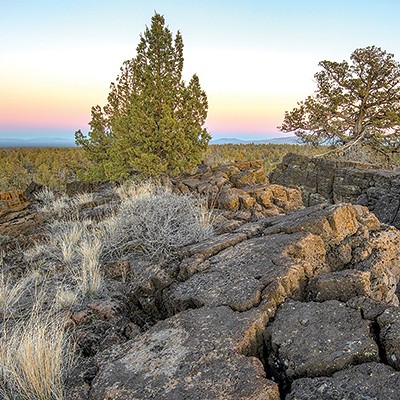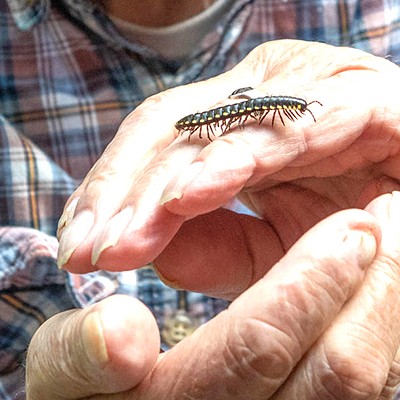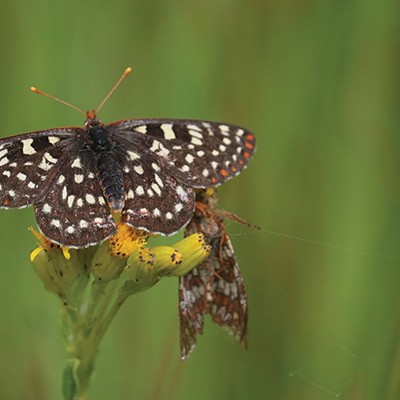Pack rats do not need to drink water, but rather get what they need from the spinach, lettuce, peas and corn they eat in your garden. They then recycle the water repeatedly and probably pee reluctantly, and when they do, it's enough to gag a maggot. Most of the white stains you see on our rim rock are pack rat scent posts or defecation sites.
Bushy-tailed pack rats in the wild are a beautiful and wonderful part of the magnificent World of Nature. However, the ones that got into my church friend's pantry and plundered his emergency food supply was a different matter altogether. Moreover, the ones that got into another friend's well house and ate all the insulation off the walls and wires were not thought of too kindly either.
Then, my good friend, Scott, a fellow Volvo enthusiast, had a pack rat that built a huge stick nest under the hood of his '68 Ford pickup. Scott probably wouldn't have minded that too much if the pack rat hadn't eaten all the insulation off the wiring harness and the spark plug wires.
Probably the most annoying thing about pack rats is that what they don't eat they either pee or poop all over - sort of like a bull in the china shop...
There are hundreds of people all over Central Oregon who have had a problem with pack rats eating, chewing, pooping all over, stacking sticks on or just stinking up everything. And they had to go.
By far the most humane way many of my other friends have solved the immediate problem of too many pack rats up to mischief is live-trapping and transporting the offenders someplace else.
Pack rats, however, have a very efficient homing ability. I know that to be a fact as I did the live-trapping thing years back. I marked their tails with fingernail polish, transported them to another location, and set them free. Within a week, they were back.
The next time I trapped them, I took them over a mile away. Within a week and a half, they were back. The next time I caught them, I took them five miles away. That did it, I never saw them again.
Over the last ten years or so, I have loaned my live traps to hundreds of people who trapped their problem pack rat(s) and hauled them away. You've got to hand it to those people; their dedication to handling their pack rat problem by not killing the offending animals is nothing short of wonderful.
At the other end of the adventure, however, it may be a different story. Wildlife, rodents in particular, are very territorial. They set up scent posts to mark the boundary of their territory and woe be the animal that invades it.
Jumping mice, those peace-loving sweet little rodents of our sandy deserts go into a tizzy when a stranger steps over the line in the sand. Males particularly will leap at the invader, tearing away with powerful back feet, armed with needle-sharp claws. Not a pretty sight...
Therefore, you can imagine what happens when a big, bushy-tailed pack rat is suddenly dumped into another pack rat's domain. All hell probably breaks loose, which may be a way of speeding up Darwin's Natural Selection. A citified pack rat may have better battling skills than its country bumpkin cousin, or it may be the other way around.
One fact remains, however, pack rats can cause many problems if they are not removed quickly, and with that statement comes a warning. The live trapping method is far better then poison, and here's why:
Pack rats, along with most of our local ground squirrels, are known carriers of the flea that carries the Bubonic plague. Way back - when the Sun was a little old tiny thing, there weren't no Moon, and the Big Dipper was a little tin drinkn' cup - I worked with epidemiologists in our lava caves searching for plague fleas and found them on ground squirrels and in pack rat middens.
If you poison a rodent that is carrying fleas the animal will die, cool off and the fleas will go looking for a new host. If you happen to come along about the time the fleas are searching for new blood they will detect your infrared heat signal and zingo, you're it. So, think twice before you kill rodents. It does take man-hours to live trap rodents and carry them off to a wilder place to live, but it's safer for you and me. Just don't release it in your neighbor's backyard or downtown.
And don't worry about the territorial struggles the pack rat will go through, only the fittest will survive, which means the survivors will be smarter and force Hav-a-Hart to build a better mousetrap.























